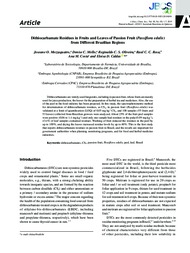Dithiocarbamate residues in fruits and leaves of passion fruit (Passiflora edulis) from different brazilian regions.
Dithiocarbamate residues in fruits and leaves of passion fruit (Passiflora edulis) from different brazilian regions.
Author(s): MOZZAQUATRO, J. O.; MELLO, D. C.; OLIVEIRA, R. C. S.; ROSA, R. C. C.; COSTA, A. M.; CALDAS, E. D.
Summary: Dithiocarbamates are widely used fungicides, including in passion fruit, whose fruits are mainly used for juice production, the leaves for the preparation of herbal tea and medicines. Also, the use of the peel in the food industry has been proposed. In this study, the spectrophotometric method for determination of dithiocarbamate residues, as CS2, in passion fruit (Passiflora edulis) was validated at a limit of quantification (LOQ) of 0.05 mg kg-1 CS2, and 108 samples (55 fruits and 53 leaves) collected from Brazilian growers were analyzed. About 25% of the fruit peel samples were positive (0.06 to 1.4 mg kg-1) and only one sample had residues in the pulp (0.09 mg kg-1), 43.4% of leaf samples contained residues. Washing of fruit reduced the residues in the peel by up to 100%, and drying the leaves increased residue levels by up to 60%. This is the first study that reports dithiocarbamate residues in passion fruit in Brazil, and the results are important for government authorities when planning monitoring programs, and for food and herbal medicine industries.
Publication year: 2019
Types of publication: Journal article
Unit: Embrapa Cerrados
Keywords: Casca, Dithiocarbamate fungicides, Folha, Fungicida, Herbicida Residual, Maracujá, Resíduo
Observation
Some of Embrapa's publications are published as ePub files. To read them, use or download one of the following free software options to your computer or mobile device. Android: Google Play Books; IOS: iBooks; Windows and Linux: Calibre.
Access other publications
Access the Agricultural Research Database (BDPA) to consult Embrapa's full library collection and records.
Visit Embrapa Bookstore to purchase books and other publications sold by Embrapa.

